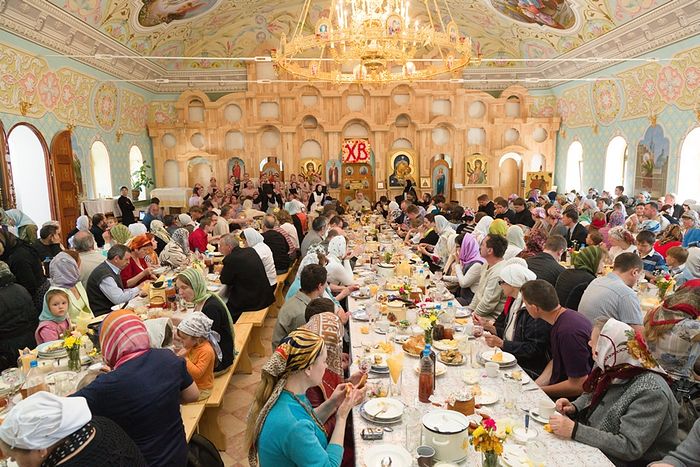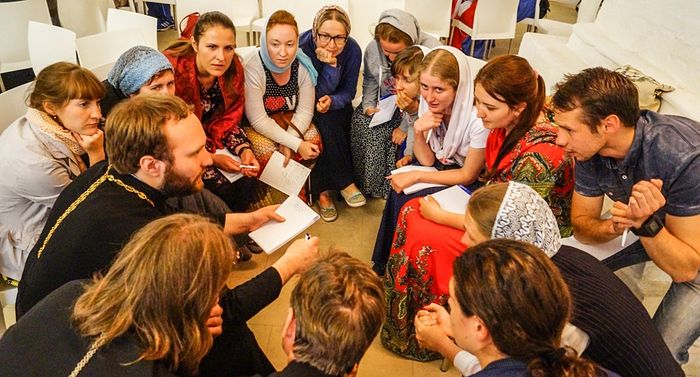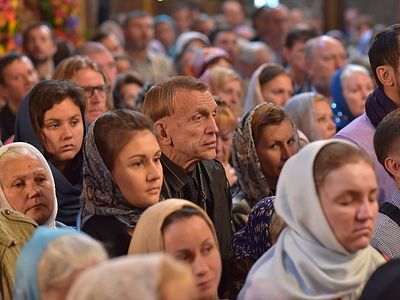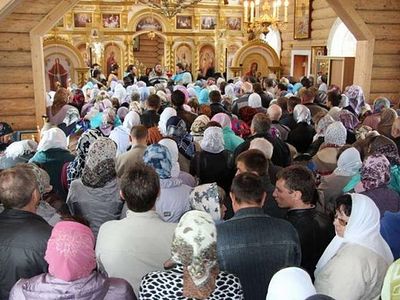Christian ministry… Despite its apparent simplicity, today this expression remains obscure for many parishioners. Or, more often, it is clear only “in general” but is somewhat inapplicable to one’s own life. However, it is vital that we begin this ministry in our lives (even if from basic things) because, as the experience of the Church demonstrates, without it spiritual life becomes ineffectual and formal. Igumen Nektary (Morozov) reflects on possible forms of Christian ministry in the life of a modern day believer.
It is natural to be together
We live in a time when Christian life—Church life, life of a parish community—is built not in a very natural way. However, the life of the first Christian communities was different: And all that believed were together, and had all things common (Acts 2:44). Of course, today it is inconceivable that members of a modern community could hold all their things in common. But, on the other hand, it is quite unnatural when members of a church community only attend services but otherwise spend all their time outside this specific church or even the community altogether. All things that we come in contact with are potentially the space of our Christian ministry, but it begins with our parish, our church. So we should start with the most basic and natural things—getting to know other parishioners better, trying to find common interests, so that a kind of common life might result from this with time.
It is not only in the sense of helping each other and participating in the destinies of the needy, but first of all—of forming one, real, big family. However, in reality we see that even at a church level it turns out either not very successful or totally unsuccessful. This is why any priest or rector of a church has to think how to form at least the heart of this community, to gather active and concerned Christians around himself, so that they, like Christians of the first centuries, could bring other people to church and help them integrate into Church life.
The external and the internal mission
It is necessary to understand that every Christian—a member of a church community in particular—should be an apostle in the simplest and the most elementary sense of this world. The word “apostle” (“apostollos” in Greek) means “one who is sent”; it means that, in fact, each of us on leaving his church assumes a role of a “catcher of souls of men for Christ”, whom the Church has sent to “fish for men”.
I like the book by Thornton Wilder [1897-1975; an American novelist and playwright], Heaven is My Destination, very much. It is a story of one zealous but, as we would say, exalted and ecstatic Protestant who strove to convert all people that he met to his faith. And he so openly and uncompromisingly condemned and exposed all the vices that he saw that he often ended up in prison, in hospital beds and other places, and once even experienced a crisis of faith and renounced it, though he later returned to the faith again. In my opinion, this is a very entertaining yet very edifying reading: On one side, it displays the kind of a missionary one shouldn’t be; and, on the other side, it shows what attitude one ought to have, because, I think, this book’s main character had the proper spirit.
Undoubtedly, we shouldn’t rush to everyone whom the Lord has placed near us; nor should we condemn someone else’s vices and shortcomings for all to hear because nobody has entrusted this job to us. But, nevertheless, we constantly get into such life situations when our word about God can touch somebody’s heart. For this we simply need to be compassionate, attentive, kind and not indifferent people—and our hearts will inspire us as to what to tell one or another person about Christ. At the beginning of a conversation we should determine a limit for ourselves, and we need to keep within this limit, just as before feeding a baby we know what amount of food it needs. In fact, the baby will give us an idea itself: it will turn away and stop eating at a certain point. Likewise, we can catch the moment when our interlocutor begins to inwardly turn away and refuse the offered spiritual food—then we need to stop immediately. It is even better to give people very small portions of spiritual food and see if they want more. If they don’t, then there is no point in continuing. It is not without reason that the Lord compares the word of eternal life with pearls. The “pearl” is something very precious, and so we need to have this sense of value in ourselves and to share it with those who listen to us.
This applies to external mission. But there is also the internal mission which exists inside the Church Herself. Most people who regularly go to church are actually the same people whom we meet in our everyday life, so they are still far from being integrated into Church life. There is no doubt that they need our support. They may get this support and advice at the church bookshop, but on major Church festivals with constant stream of people, shop workers may have no time to answer their questions. And it is here that parish members can act as missionaries. I fully support the idea of “the missionary watch” at church doors, because in many cases newcomers even cannot reach the church shop: They enter a church, see a great concourse of people, sometimes also several priests exclaiming something at he Polyelios1, and then they are frightened, embarrassed and leave the church. And at these very moments it is so important that somebody approach them and say: “There is nothing frightening here. What did you want?” Maybe somebody will laugh at this idea, but this way great many people will surely be saved for the Church.
And another point. When a priest hears the confession of a person who wants to take Communion for the first time, he ought to explain him a great many things. And it is always extremely helpful when two or three people from among the congregation stand a little way off during confession, so the priest can see them and at any moment turn this person over to them, so that they could tell him about Communion and explain how to prepare for it. And some parishioner might be able to take this convert under his patronage and help him grasp the ABCs of Christian life and services. And this also brings us closer to early Christians, when a member of the Church would not only bring someone to church but also minister to him for a while until the latter became a full-fledged member of the community.
Finding your dimension
It is important for an Orthodox Christian who is called to apostolic ministry to ask himself this question on a regular basis: “What kind of a person am I?” and to answer it honestly: “To what degree so I have tact and the gift of eloquence, and to what extent I can carry different truths to people?” Then we will be able to ask ourselves another question: “What is my dimension?” For some, the scope of their ministry is in familiarizing other people, seeking God, with the basics of the Orthodox faith; for some it is in telling converts about the preparation for the sacraments of confession and communion; and for others it will be enough to bring people to church and lead them up to a priest who will answer their questions himself. It should be mentioned that this dimension largely depends on our spiritual state: if a person stops living an active Church life, he begins to feel that he has nothing to share with other people.
It is very important to look not only at our dimension, but also at the fruit that our communication with people brings forth. If we see that the results of our ministry efforts are disorder, discord and annoyance, it means that we are doing everything wrong. We need to inform our priest about all of this and to try together with him to correct the ways we choose when we become close friends with people, or seek a method of approach. If we see that our relations with people bear good fruit, that we have managed to help someone begin Church life, then it is, on the one hand, a reason for joy and, on the other hand, a reason for keeping a closer watch over ourselves, in order not to become conceited and arrogant. We should also remember that every person who in the performance of his Christian duty helps other people will inevitably suffer from various temptations. The more pride we have (coupled with the feeling that we perform good works with our own strength) the more temptations we have.
Another quality which is vital for Christian ministry is constancy. Judging by my personal pastoral experience, I can say more broadly, that constancy and reliability are important. As rector of a church I frequently meet with different people, we discuss one or another undertaking, and I see that they are excited and enthusiastic. But when it comes to the question, “What are each of you ready to do? What portion of the work can you take upon yourselves?” it turns out that each of them wholeheartedly supports the cause but is not prepared to take part in it. In many instances this happens because it seems them that it is beyond their power. But in actual fact, what is expected from them is by no means beyond their power because each of them was invited to choose the degree of his participation. The participation level can be at one hundred per cent, at fifty per cent, ten per cent… But, nevertheless, it is a contribution and something can come of it. But it is essential at the very beginning to understand what you can do, and then do it continuously. If you withdraw from participation and someone else follows you, then the several remaining participants who are working full-time as it is will have to bear burdens that exceed their strength. And, as a rule, the result is unavoidable: First they stand under the burden, then bend under its weigh, and finally the burden weighs them down and crushes them. So, before embarking on some obedience or ministry, we should remember that it will require consistency from us. It is necessary to estimate your abilities and strength, and it is better to start with little things and gradually come to greater ones.





